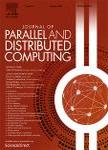版权所有:内蒙古大学图书馆 技术提供:维普资讯• 智图
内蒙古自治区呼和浩特市赛罕区大学西街235号 邮编: 010021

作者机构:State Univ Ponta Grossa UEPG Dept Informat Ponta Grossa Brazil Fed Univ Parana UFPR Dept Informat Curitiba Parana Brazil
出 版 物:《JOURNAL OF PARALLEL AND DISTRIBUTED COMPUTING》 (并行与分布式计算杂志)
年 卷 期:2019年第126卷
页 面:13-33页
核心收录:
学科分类:08[工学] 0812[工学-计算机科学与技术(可授工学、理学学位)]
基 金:Brazilian Research Council (CNPq) [306103/2015-0, 311451/2016-0] Ministry of Education CAPES [88881.172797/2018-01]
主 题:Evolutionary computing Multi-swarm PSO Many-objective optimization problems
摘 要:In this work we present two parallel PSO strategies based on multiple swarms to solve MaOPs (Many Objective Optimization Problems). The first strategy is based on Pareto dominance and the other is based on decomposition. Multiple swarms execute on independent processors and communicate using broadcast on a fully connected network. We investigate the impact of using both synchronous and asynchronous communication strategies for the decomposition-based approach. Experimental results were obtained for several benchmark problems. It is possible to conclude that the parallelization has a positive effect on the convergence and diversity of the optimization process for problems with many objectives. However, there is no single strategy that is the best results for all classes of problems. In terms of scalability, for higher numbers of objectives the parallel algorithms based on decomposition are always either the best or present comparable results with the Pareto approach. There are exceptions, but only when the problem itself has discontinuities on the Pareto Front. (C) 2018 Elsevier Inc. All rights reserved.